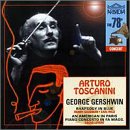| All Artists: Gershwin, Goodman, Wild, Levant, Toscanini Title: Gershwin: Rhapsody in Blue (Earl Wild, piano); An American In Paris; Piano Concerto in F (Oscar Levant, piano) - recorded by Arturo Toscanini & the NBC Symphony Orchestra Members Wishing: 1 Total Copies: 0 Label: Arkadia: the 78's Original Release Date: 1/1/1942 Re-Release Date: 4/15/2000 Album Type: Import Genre: Classical Styles: Forms & Genres, Concertos, Theatrical, Incidental & Program Music, Historical Periods, Modern, 20th, & 21st Century, Instruments, Keyboard, Symphonies Number of Discs: 1 SwapaCD Credits: 1 UPCs: 675754178420, 8011571785601 |
Search - Gershwin, Goodman, Wild :: Gershwin: Rhapsody in Blue (Earl Wild, piano); An American In Paris; Piano Concerto in F (Oscar Levant, piano) - recorded by Arturo Toscanini & the NBC Symphony Orchestra
CD Details |
CD ReviewsA different side of Toscanini madamemusico | Cincinnati, Ohio USA | 09/09/2000 (4 out of 5 stars) "This CD should be required listening for all those who claim that Toscanini was a "tyrant," "inflexible," "incapable of deep expression."He was 75 years old when he played Gershwin for the first time, the "Rhapsody" heard here. He had absolutely no concept of this musical style, but he was willing to learn. To this end he hired Benny Goodman to help him out by playing the clarinet solo in the beginning, and pianist Earl Wild who was gaining a reputation as a Gershwin expert. Benny cracks a high note at the top of his highest phrase, but otherwise sounds wonderful, while Wild plays with a generous amount of rubato and rallentandos while Toscanini follows his lead. (That's right: Toscanini FOLLOWS Wild's lead.) The result is one of the warmest, most romantic of all Toscanini recordings.At age 76, Toscanini added "American in Paris" to his repertoire. Once again, to the surprise of many, his interpretation was totally idiomatic: jazzy, fluid, playful. It was so good that RCA had him make a recording of it for commercial release, but this broadcast version is even a shade better. By this time, Toscanini was beginning to understand Gershwin's idiom, and so the performance is even more assured than the "Rhapsody."At age 77, Toscanini approached the Concerto in F. This time he had Oscar Levant, Gershwin's friend and pupil, at the piano. Levant disagreed with Toscanini, who by now considered himself fully conversant with Gershwin's idiom, over a few details, yet these two famous neurotics worked together hand-in-glove. Levant himself admitted that the performance was "breathtaking." The first movement is so exciting that the audience couldn't help but applaud it out of turn! In the second movement, Harry Glantz plays the famous trumpet solo with as much warmth and feeling as the legendary Bix Beiderbecke did in the 1928 Paul Whiteman recording. The third movement shoots out with coiled-spring tension and never lets up, revealing details of orchestration and musical turns of phrase that are quite astounding, even if you think you know this concerto inside out.The sound quality of the Rhapsody and the Concerto are a little boxy; the American in Paris is wonderfully clear. But this CD is highly recommended to both Gershwin fans and those who think they don't like Gershwin. Toscanini, Wild, Levant et. al. may make you change your mind."
|


 Track Listings (5) - Disc #1
Track Listings (5) - Disc #1